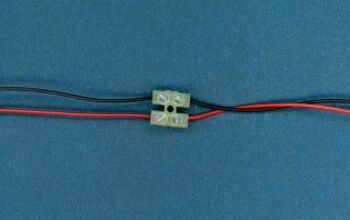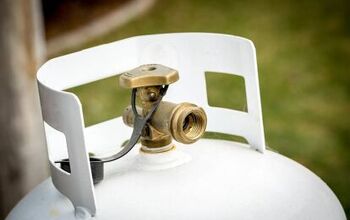Why Is My Fish Tank Losing Water So Fast?

It is an understandably scary predicament when your fish tank seems to be losing water faster than usual. Not only does this put your fish at risk, but it can also damage your aquarium plants. You might want to know: why is my fish tank losing water so fast?
Fish tanks lose water too quickly when the water temperature becomes higher than 80 degrees Fahrenheit. This also happens if the filter isn’t level and pushes water out of the back of the tank. Rapid water loss is also common if the tank is below a vent or fan that causes too much surface agitation.
It may also be a matter of an O-ring that leaks because it’s the wrong size. Follow along as we explore why your fish tank is losing water so fast and highlight the best solutions.
Why Does My Fish Tank’s Water Evaporate So Fast?
1. High Temperatures
Fish are quite sensitive to high temperatures, and heat can also cause changes in the environment. For example, this can cause algae to grow and thrive at an unhealthy rate. Extreme heat can also explain why your fish tank is losing water so fast.
The water in an aquarium must typically stay between 75 and 80 degrees Fahrenheit. Otherwise, the fish may overheat and die, and the water will evaporate too quickly. One of the best ways to maintain a healthy temperature is to keep your fish tank away from sun-facing windows.
Cooling fans are just as important as heaters for fish tanks as they are essential if the water surpasses 80 degrees. Keep your fish tank in a room with healthy airflow to ensure the water doesn’t overheat. You must never run your aquarium light for more than 12 hours.
2. Unlevel Filter
What type of filter do you have in your fish tank? Hang-on-back filters are quite popular, but they can cause problems if you don’t set them up properly. As the name suggests, these filters hang on the back of your fish tank and only part of them is submerged in the water.
It’s important to make sure that your hang-on back filter is level. If the filter is uneven, it may cause water to leak out of the tank from the back. This is hard to discover unless you check behind your fish tank to see a stream of water.
Not only can this stream of water damage your walls, but it can also harm your fish if the water leaks out too quickly. Carefully turn off your pump, remove it, then put it back in the tank and make sure it is level. Otherwise, the problem will continue and the pump won’t work as best as it can.
3. Cracked Glass
Cracked glass is the worst-case scenario if your fish tank is losing water. Even a hairline crack is enough to make your fish tank quickly lose water. However, dramatic cracks mean that you must act immediately, as it puts your fish at risk of rapid oxygen depletion.
Walk around your aquarium and find the source of the crack. It’s important to check multiple points, as there may be several cracks. While small cracks are repairable, it’s not worth it to keep your fish tank if there is a big crack or even several small cracks.
In that case, you must replace your fish tank. This is a tough process, as you must carefully drain the water, remove your fish and equipment, and transport them to a new tank. Otherwise, the tank could burst at any moment, and your fish will likely die.
4. O-Ring Leak
Fish tank pumps and filters have O-rings to create a seal. This is essential, as it prevents water from leaking — that is, if it is intact. In some cases, Canister filters have trouble with O-ring leaks, especially if the O-ring is the wrong size.
Sometimes, people mistakenly buy the wrong size replacement O-ring, which doesn’t create a strong seal. That’s why you must carefully measure the connection to ensure you get the correct part. Luckily, you can find multi-packs of aquarium O-rings for under $20.
Pull the pump or filter out of the water before you replace the O-ring. Otherwise, the leak could become more serious. Work quickly to replace the O-ring, so that your tubing doesn’t leak more water. This should solve the issue unless there is a problem elsewhere.
5. Excessive Air Movement
Is your fish tank underneath or near a fan that blows often? If so, that could explain why your fish tank loses water so fast compared to a standard aquarium. Movement is great for a fish tank, but excessive movement leads to water loss.
You may notice more water bubbles forming at the surface when your fish tank is below a fan or vent. The more bubbles you see, the more likely the water level is to be lower. This is an easy problem to fix, as you can simply move the fish tank away from the fan.
That said, you still want at least some surface agitation in your fish tank. Agitation helps remove some of the negative biofilms that can eventually make your fish tank dirty.
How To Reduce Water Loss In A Fish Tank
While water loss is natural, several simple steps can help minimize it, such as:
Use A Glass Lid
Glass lids are great for many reasons, and one of them is that they can help reduce water loss. Evaporation is unavoidable in an aquarium, but glass lids ensure that some of the water returns to the tank. Granted, you must still change the water at least once every 2-3 weeks in most cases.
Some homeowners forego lids for their fish tanks altogether, but that is quite risky. Not only does this increase the evaporation rate, but your fish tank will also get dirty quickly. This also doesn’t protect your fish tank from cats.
Increase Humidity
How humid is the room that you keep your fish tank in? Dry air can explain why your fish tank loses water faster than usual, and this often relates to climate. For example, fish hobbyists in humid states like Louisiana and Florida are unlikely to need to raise the humidity level in their homes.
Because of that, their fish tanks will likely lose water at a normal rate, unless their home is unusually dry. Conversely, homeowners in dry states like New Mexico and Arizona may need to use humidifiers to make their homes more humid.
Keep the room you have your aquarium at 80% humidity to reduce water loss in your fish tank. Not only is this great for your fish tank, but it also comes in handy if you grow plants indoors.
How Often Should You Change The Water In An Aquarium?
You must change the water in an aquarium every 2-3 weeks maximum, but many people do it weekly. The nitrate levels in your tank can reach a dangerous level if you don’t regularly change the water. This can cause harmful bacteria to accumulate, cause fish disease, and lead to death.
You typically only need to change 25% of the water in your aquarium at once. However, you may need to change up to 50% of the water if your tank is dirty and your fish behave strangely. Never replace all of the water unless it’s an emergency. Fish become acclimated to the bacteria, so it shocks them when they enter fresh water.
Summing It Up
If your fish tank loses water too quickly, it’s likely because the temperature exceeds 80 degrees Fahrenheit. This can also happen if the filter isn’t level and water drips down the back of the tank. Otherwise, it could be because of an O-ring leak, excessive air movement, or cracked glass.
Related Guides:

Nick Durante is a professional writer with a primary focus on home improvement. When he is not writing about home improvement or taking on projects around the house, he likes to read and create art. He is always looking towards the newest trends in home improvement.
More by Nick Durante











![10 Best Electric Pressure Washers – [2022 Reviews & Guide]](https://cdn-fastly.upgradedhome.com/media/2023/07/31/9070600/10-best-electric-pressure-washers-2022-reviews-guide.jpg?size=350x220)
![10 Best Cordless Leaf Blowers – [2022 Reviews & Ultimate Guide]](https://cdn-fastly.upgradedhome.com/media/2023/07/31/9070789/10-best-cordless-leaf-blowers-2022-reviews-ultimate-guide.jpg?size=350x220)












![Standard Dining Room Table Dimensions [for 4, 6, 8, 10 and 12 People]](https://cdn-fastly.upgradedhome.com/media/2023/07/31/9074335/standard-dining-room-table-dimensions-for-4-6-8-10-and-12-people.jpg?size=350x220)

